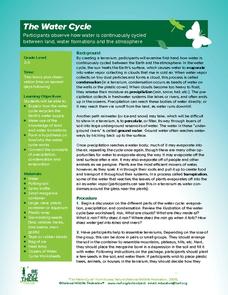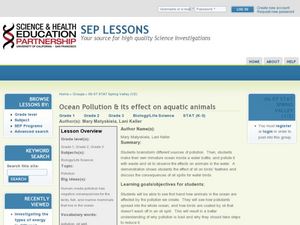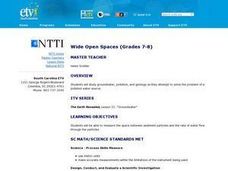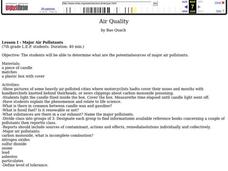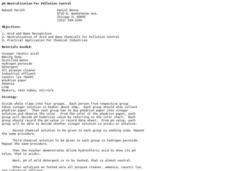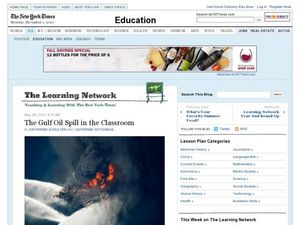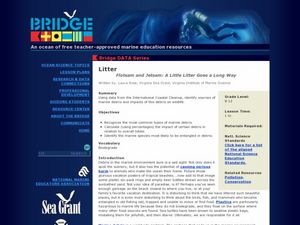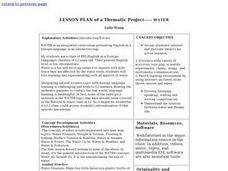Curated OER
The Water Cycle
Learners are introduced to the components and importance of the water cycle. They are shown how groundwater moves using a model. Students list 9 places on earth where water is found. They define the terms cycle and water cycle.
Curated OER
Drinking Water Around the World
Students explore the concept of water quality. In this drinking water instructional activity, students discuss the quality of water around the world, conduct research about drinking water, and then write essays about water quality.
Illinois Department of Natural Resources
Section Four: How Can We Protect Biodiversity?
Look into the future with a lesson plan on biodiversity and natural habitats. Learners read articles about different perspectives when it comes to planning future development, and decide which angle is the highest priority in a group...
NOAA
Off Base
How does carbon dioxide affect the world's oceans? The final installment in a series of six lessons has pupils research ocean acidification, then conduct an experiment to witness the delicate balance that exists in our seas. Materials...
Curated OER
Are You Thirsty: The Effects of Pollution on Drinking Water
Middle schoolers discuss the different causes of water pollution. In this ecology lesson, students brainstorm ways to purify polluted water. They formulate their conclusion based on the results of the experiments.
Curated OER
Water, Water, Everywhere (High School)
Students view different types of water to make the point that salt or polluted water isn't useful for drinking water. They chart causes, consequences and solutions to water scarcity based on internet research. They write an essay as...
Curated OER
Not A Drop To Drink
Fifth graders discuss ways that humans pollute our natural water supply. They observe a video about water pollution. Students identify eight different ways water is contaminated. They investigate an oil spill by conducting a hands-on...
Curated OER
Ocean Pollution & its Effect on Aquatic Animals
Students consider the concept of ocean pollution. In this ocean instructional activity, students participate in a hands-on demonstration in order to replicate an oil spill and its effects on marine life.
Curated OER
Wide Open Spaces
Learners examine the problem of groundwater pollution. In groups, they develop a solution to solve the problem of a local polluted water source. They also practice measuring the space between sediment particles and the rate of water flow.
Curated OER
Crossing Polluted Waters
Pupils investigate the different concepts involved in crossing a body of water that is polluted through a simulation that is supposed to be done without a boat. The goal of the lesson plan is for groups to role play after creating a plan...
Curated OER
Non-Point Source Pollution
Students study non-point source pollution. They research the concept of bio-degradation and/or Nutrients/Fertilizers and discuss how non-point source pollution impacts the environment. Afterwards, they participate in an interactive...
Curated OER
Pollution - What is It Doing to Us?
Students recognize some forms of pollution. In this science lesson plan, students recognize and understand some of the devastating effects of the acid rains and other possible factors that are contrary to the pH balance of nature.
Curated OER
Air Pollution: Visible and Invisible
Fourth graders work together to complete an experiment on air pollution. They identify visible and invisible forms of pollution. They gather their data in notebooks and analyze their results to end the lesson.
Curated OER
Water Quality and Dissolved Oxygen
Students investigate the relationship between dissolved oxygen and organic materials and aquatic organisms. This is a 3-lesson series in which students explore dissolved oxygen and then design an experiment testing the effects of changes.
Curated OER
Air Quality
Students determine potential sources of major air pollutants, explain how acid rain is generated and how it affects the environment, discuss global warming, and explore protective role of ozone and cause of ozone layer thinning. Lessons...
Curated OER
Is Our Water Clean?
Students identify qualities of clean water which will develop an awareness of people in the community who keep our water clean. This lesson plan has a literature tie-in with the "Magic School Bus" series.
Curated OER
Water Resources and the Role of the Independent Sector
Students identify the need to maintain and protect our natural resources. In this natural resource lesson plan, students study pictures of the effects of pollution on animals and water. Students brainstorm a list of ways water is an...
Curated OER
PH Neutralization For Pollution Control
Learners recognize whether a solution is an acid or a base. In this acids and bases lesson plan, students use chemicals and identify if those chemicals are acids or bases. From the conclusion, learners will be able to identify if the...
Curated OER
The Gulf Oil Spill in the Classroom
Students explore the concept of environmental stewardship. In this interdisciplinary lesson plan, students investigate the media response to the Gulf oil spill as they examine live streaming video, interpret data, and share their...
Curated OER
LitterFlotsam and Jetsam: A Little Litter Goes a Long Way
Students explore the concept of environmental stewardship. In this science lesson, students investigate data from the International Coastal Cleanup, identify sources of marine debris, and discover the impacts of this debris on wildlife.
Curated OER
Lesson Plan of a Thematic Project - Water
Sixth graders investigate the properties of water. In this life science instructional activity, 6th graders create a concept map of water. They share their work with the class.
Curated OER
Watershed Lesson Plan
Students are introduced to the concepts of a watershed, stream flow and water quality. This five-day plan is an excellent way to introduce students to the concepts involved. They create their own watershed using a paper bag, water and...
Curated OER
Week 8 - Sea Life
Using a magnifier, mini marine biologists examine the barbules of a bird feather. They swirl the it into a mixture of oil and water and then re-examine the feather. After the activity, discuss how the oily feathers pose a problem to sea...
Alabama Learning Exchange
Nature's Life Cycle
Become a member of the Pollution Patrol and stand up to litter! After discussing the life cycle of seeds and discussing how plants figure into the food chain, young conservationists engage in several activities involving podcasts,...


